July Declaration: Where is the roadmap for our future journey?
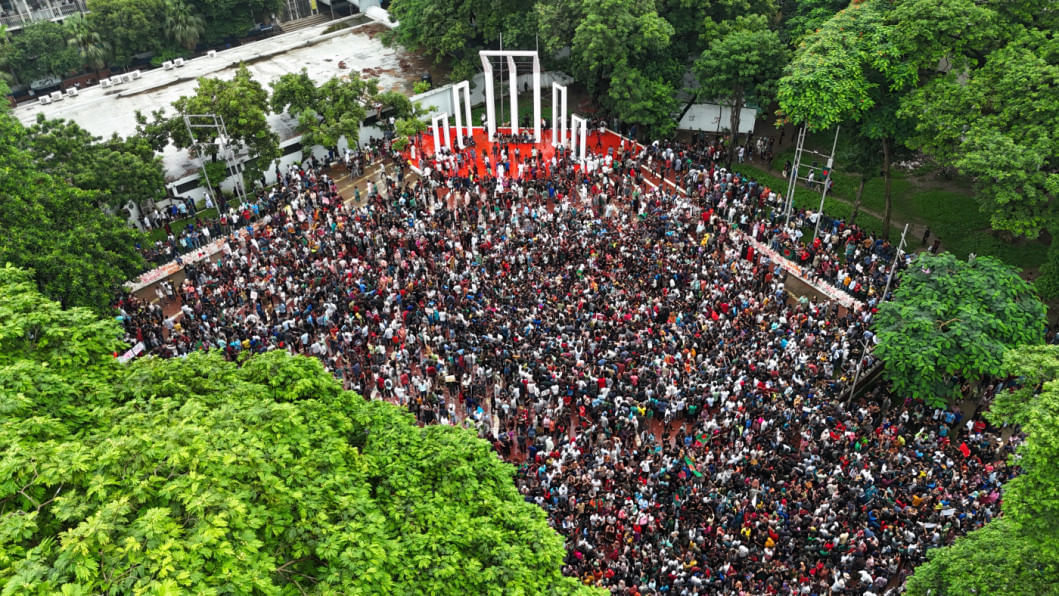
Condemn Sheikh Hasina's rule of over 15 years as much as you want, as there is enough fact-based evidence to do so. (See our recent investigative stories, including the one published on Thursday, August 7). But don't denigrate our freedom struggle, our greatest source of pride, the moment when our people made the biggest sacrifice ever. Our Muktijuddho is indelibly etched in our hearts, minds, and consciousness. True history will never permit its denigration, although contrived history may. But that "history" will never stand the test of time. That is the lesson of history.
Wasn't the July Declaration meant to chalk out our future on the basis of the values that the uprising represented? Wasn't it supposed to provide a roadmap of how Bangladesh will achieve the goals that the past oppressive regime prevented?
Instead, we have another example of rewriting history.
Whatever may be the stance of independent political parties, the interim government's position must have some authentic base. What Prof Yunus read out as the chief adviser—and which is being proposed for incorporation into our constitution—is but an instance of a "cherry-picked" version of our past.
In the July Declaration, we have a two-paragraph version of our freedom struggle that gave us an independent country. The two paras include a reference to colonial rule and 23 years of "authoritarian Pakistani regime." We "established the state of Bangladesh through a bloody Liberation War following the Declaration of Independence on March 26, 1971." The following para says "… the people of Bangladesh made the utmost sacrifice through a long struggle to materialise a liberal democratic state … based on equality, human dignity, and social justice…"
That was the depiction of our 23 years of struggle against Pakistan's military and brutal rule.
There is no mention in the declaration of our Language Movement and the first killing of students in the newly formed Pakistan and the birth of "Ekushey February." There is no reference to the historic election of 1970 that gave our political leadership—represented at that time by the Awami League (AL)—the legitimacy to speak on behalf of the people. It was because the leaders were elected that the then political leadership could "declare" independence when the Pakistan Army attacked us in the most brutal and barbaric manner. The election was most crucial for us to form the "government in exile" and gain international support, without which we could not have carried on with our independence war.
In addition, it is shameful that Prof Yunus, as head of the government, read out a document that did not mention "genocide" committed by the Pakistan army that started with unparalleled brutality on the night of March 25, 1971. There may be some controversy about the figure of three million people killed, but there is no doubt that hundreds of thousands of innocent men, women and children were indiscriminately killed just because they were Bangalees, citizens of East Pakistan.
There were 10 million refugees—the UNHCR called it the "largest single displacement of refugees in the second half of the century"—who took shelter in India, where they received food and medicine for the nine months of the war. (We later had many issues with India, especially on sharing water and many others, but their role in support of our struggle for independence will remain a part of history.)
The declaration also does not mention Mukti Bahini, who are heroes of the most glorious phase of our history. Dhaka University, which is the centre of the July Uprising, was also the centre of the creation and propagation of the Mukti Bahini at that time.
What about the indiscriminate rape of our women by the Pakistani army? Ethnic cleansing was a part of state policy of Pakistan during those crucial nine months. A recent book titled The Vortex: A True Story of History's Deadliest Storm, an Unspeakable War, and Liberation—by Scott Carney and Jason Miklian—adds invaluable evidence to the already established ones.
In 1971, Prof Yunus himself was an active member of an expatriate group in the US who, along with others, did invaluable work to propagate the legal and moral justification of our Liberation War. He met US senators, political leaders from both the Republican and Democratic party, and wrote pamphlets and media articles depicting our struggle. What did he say to those American leaders at that time? Wasn't "genocide" a part of his story? Is he disassociating himself from his own laudable role in 1971? If not, then why isn't it a part of the document he read out?
It is perhaps redundant to note that the man who led and inspired us throughout our nine months of struggle for freedom never found a mention—Bangabandhu Sheikh Mujibur Rahman.
The July Declaration, which is supposed to outline the "New Bangladesh," has only few paras, out of 28, that make some references to the future, and that too in the most vague and generalised terms like "ensure good governance," "free fair election," "rule of law," "economic and social justice." There is one para—26—about the environment "… protect rights of the present and future generations through an environment friendly, climate resilient, sustainable and inclusive development strategy…"
There is no mention of future direction in education, employment generation, poverty alleviation, health for the poor, etc. There is no focus on the downtrodden and the poor. Again, there is nothing—not surprisingly though—for women. They constitute 50 percent of our population and there is not even a mention about their plight.
What stunned us is the absence of any special focus on the youth in the document. It is the youth who gave us an opportunity to build a new Bangladesh. In several conferences, Prof Yunus eulogised the role of the youth and pinpointed their importance in building a future not only of Bangladesh but of the whole world.
In para 9 of the July Declaration, Sheikh Hasina's regime is called "anti-people, autocratic, against human rights that turned Bangladesh into a fascist, mafia and failed state and thereby tarnished Bangladesh's image." There is enough ground to accept all the charges, but was Bangladesh a "failed state?" Forget everything else, are we not graduating from LDC to a middle-income country status? Didn't this government itself refuse to postpone the "graduation" time, as requested by the business community, as we are ready? Is this possible graduation a sign of a "failed state?" Are we not "tarnishing" Bangladesh's image now?
It is our view that once again, we are spending too much time and energy in reference to the past. The real need of the hour is a roadmap for the future, focusing on that crucial promise of the July Uprising. While the detailed programme for the future may come out in the "July Charter," the "dream of the July revolution" must be incorporated in the "Declaration."
Whatever our emotions may dictate, our future, in a most competitive world of the 21st century, must be based on quality education, work ethics, efficiency, productivity, science, and AI-related planning and investing our meagre resources in producing a highly skilled human resource. We are great at envisioning but very weak in realising that vision. Implementation of projects in a cost-effective manner has been eluding us from our very inception. After nearly half a century of independence, our education system remains one of waste, low quality and inefficiency.
Many scholars, both national and international, ask the question, "Why are you guys so obsessed with the past? Why can't you let historians work on that while the rest of you work to build the future?" Repeated observations from scholars of varied backgrounds stuck in my mind and forced me to ponder that question. Then, it dawned on me that not only are we obsessed with the past, but we also think nothing of distorting it. We love to suit it to our own political and ideological perspective, whatever may be the cost in terms of credibility, authenticity and building trust. Even when we repeatedly see that "contrived history" falls with the fall of regimes, we have no qualms in blatantly replacing facts with our own fancied version of it. Much of our intellectual community, who toed the lines of this group or the other, are guilty of it.
We have suffered enough at the hands of "tailor-made" history. The time has come to learn from that mistake and not repeat it. We remember how, with regime changes, school textbooks changed too; how recognised and highly respected authors got dropped because of a particular regime's likes and dislikes. Because we tinker with the past, we are unable to build a future of stability and trust. This time, we should not make that mistake again. In a relentlessly evolving, AI-dominated world, we may not get another chance.
Mahfuz Anam is the editor and publisher of The Daily Star.
Follow The Daily Star Opinion on Facebook for the latest opinions, commentaries, and analyses by experts and professionals. To contribute your article or letter to The Daily Star Opinion, see our submission guidelines.

 For all latest news, follow The Daily Star's Google News channel.
For all latest news, follow The Daily Star's Google News channel. 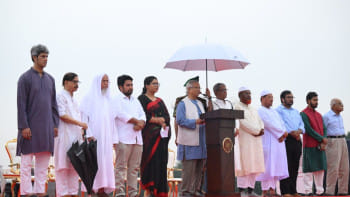




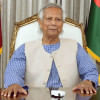
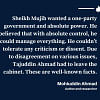


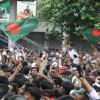

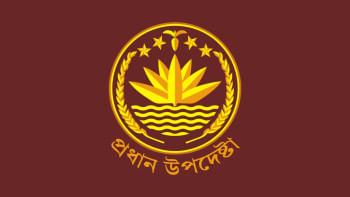
Comments